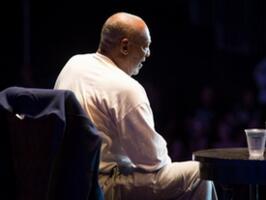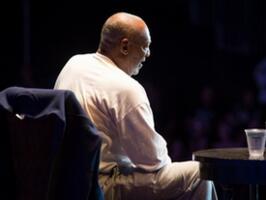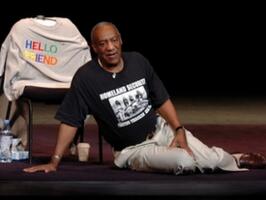Cosby Is the Real Prophet, Not Wright
A Commentary by Froma Harrop
Jeremiah, you're no Jeremiah. Although Barack Obama's controversial former pastor the Rev. Jeremiah Wright puts himself at the center of a prophetic tradition of the Afro-American church, he's not much of a prophet. The prophet in the Biblical mode often tells his people what they don't want to hear. Wright only mimics the prophet in his fiery condemnations of America. When it comes to the feelings of those who employ him, he's strictly on tiptoe.
Around the time Wright was fluffing his feathers before the national media, a genuine prophet appeared in Newark, N.J., to deliver a tough look-in-the-mirror message to fellow African-Americans. The visionary was entertainer Bill Cosby, and his theme encapsulated in the title of a book he wrote with Harvard professor of psychiatry Alvin Poussaint: "Come on, People! On the Path From Victims to Victors."
For his candor, Cosby has been tarred by black and white intellectuals as "blaming the victim." He's been accused of worse things, but that's the lot of the prophet. "A prophet is despised in his own country, and in his own house, and among his own kin," Jesus says in the Book of Mark.
The biblical Jeremiah launched invective against priests, kings and, above all, his neighbors. In highly unflattering terms, he tells the Israelites that their own iniquity would bring about their downfall. Purporting to convey the words of God, he says, "Will you steal, murder, commit adultery, swear falsely, burn incense to Baal, and go after other gods that you have not known, and then come and stand before me in this house, which is called by My name, and say we are delivered to do all these abominations?" (Jeremiah, 7:9.)
The public did not respond warmly to this negative commentary. People in his hometown wanted to get rid of Jeremiah, lest growing anger toward the prophet be turned on them. The princes put Jeremiah in prison following one of his bleak prophecies. And according to some accounts, he was stoned to death.
In America, preachers starting with the early New Englanders rained brimstone onto their congregations. One of the most famous no-holds-barred sermons was Jonathan Edwards' "Sinners in the Hands of an Angry God" (1741). "Your wickedness makes you as it were heavy as lead, and to tend downwards with great weight and pressure toward hell," Edwards writes, describing the torments there in excruciating detail.
This is not feel-good religion. Edwards went so far as to publish the names of some young church members thought to be reading "impure books." The congregation fired him.
Jeremiah Wright's congregants are building him a $1.6 million house on a golf course.
Cosby may deliver his message in a more supportive manner than the old Hebrew prophets, but he doesn't do much mincing of words. Addressing an NAACP gala in 2004, he famously said: "Fifty percent dropout rate, I'm telling you, and people in jail, and women having children by five, six different men. Under what excuse?" He goes on: "You can't keep asking that God will find a way. God is tired of you."
Not surprisingly, Cosby has come under attack -- some pretty vicious -- by black and white intellectuals who prefer the script that places all fault for the plight of black America on white America. His points, however, are being seriously discussed within the African-American community.
Last week, Newark Mayor Cory A. Booker introduced Cosby at a conference of community services as follows: "He's speaking to the heart of the matter, and he speaks to the realities of what a lot of folks are experiencing."
That's what a prophet does. The real kind.
COPYRIGHT 2008 THE PROVIDENCE JOURNAL CO.
DISTRIBUTED BY CREATORS SYNDICATE, INC.
Views expressed in this column are those of the author, not those of Rasmussen Reports.
See Other Political Commentary.
See Other Commentaries by Froma Harrop.
Rasmussen Reports is a media company specializing in the collection, publication and distribution of public opinion information.
We conduct public opinion polls on a variety of topics to inform our audience on events in the news and other topics of interest. To ensure editorial control and independence, we pay for the polls ourselves and generate revenue through the sale of subscriptions, sponsorships, and advertising. Nightly polling on politics, business and lifestyle topics provides the content to update the Rasmussen Reports web site many times each day. If it's in the news, it's in our polls. Additionally, the data drives a daily update newsletter and various media outlets across the country.
Some information, including the Rasmussen Reports daily Presidential Tracking Poll and commentaries are available for free to the general public. Subscriptions are available for $4.95 a month or 34.95 a year that provide subscribers with exclusive access to more than 20 stories per week on upcoming elections, consumer confidence, and issues that affect us all. For those who are really into the numbers, Platinum Members can review demographic crosstabs and a full history of our data.
To learn more about our methodology, click here.



